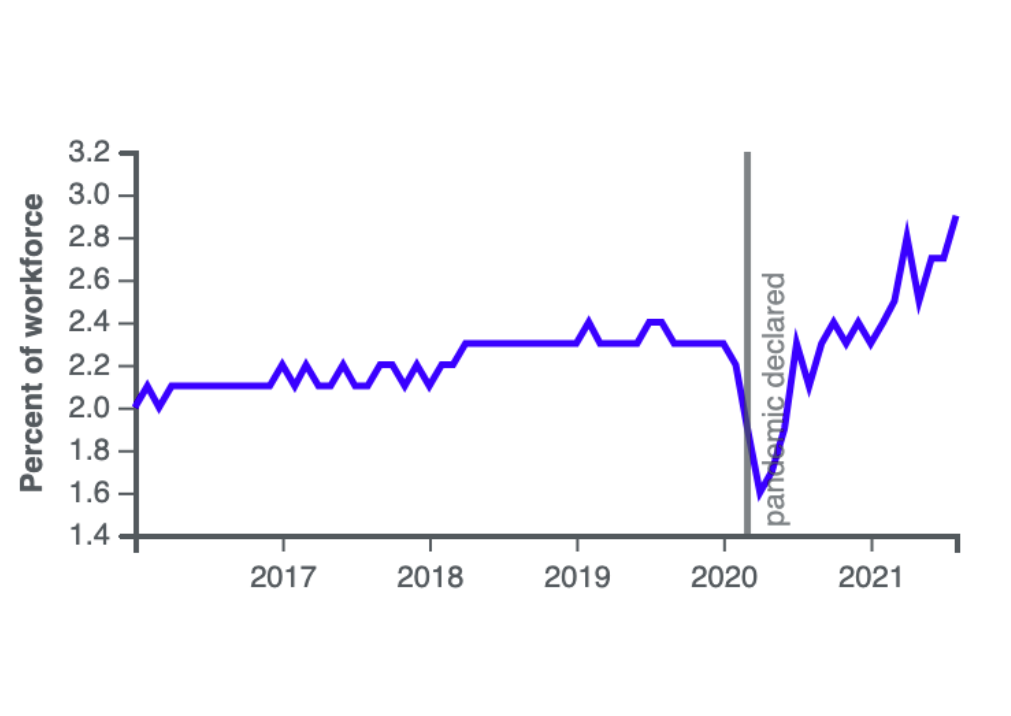Wednesday morning, 10.30 am. Elise sat at her work desk at the corner of her bedroom and emailed in her resignation.
It took her less than 5 minutes. It had taken 2+ years to reach a point where she felt she couldn’t continue at work anymore.
Elise was one of 4.3 million Americans who quit their jobs in August this year. I am seeing various terms being used to describe these messy mass resignations - The Great Resignation, the Big Quit, Striktober etc. Call it any name you like.
As I watched the reports and spoke to leaders driving organizational learning and cultural ethos about these resignations, I could picture a giant bell being rung in the middle of our corporate setups. Every person resigning was leaping onto the bell-rope to ring that bell harder. The sound was getting deafening. It is a wake up call like we haven’t seen in a long time.
I am not shocked.
I hadn’t anticipated (who honestly could have?) the mass resignations. However, the idea of people being unhappy with work and taking action on this definitely wasn’t surprising.
I came across a survey from LinkedIn that linked the pandemic to the people’s feelings about their work. 74% of people surveyed believed that spending time at home had given them the chance to rethink their current job.
They were unhappy about the general stress level and consequently were rethinking their current job over two times.

"JOLTS". Economic Policy Institute. Retrieved 2021-09-14.
Resignation rates plummeted in the initial stages of the COVID-19 pandemic, but returned to pre-pandemic levels in July 2020 and began reaching record numbers in April 2021.[1]
While these shifts are putting pressure on leaders and managers, many are optimistic.
Nearly 71% of leaders feel pressured to change working models and adapt policies to enable greater flexibility. And given that 87% of employees would prefer to stay remote at least half of the time, this flexibility is likely to be good for both people and business.
In the workplace, accountability refers to the ownership employees take for their performance and activities. The concept of accountability helps companies ensure that every member of a team is responsible for the quality of their work.
Surprisingly, data shows that 82% of managers have “limited to zero” ability to hold others accountable. Even though over 91% of employees believe that “effectively holding others accountable” is one of their company’s top needs.
One of the basic issues with accountability is that it must be perceived as more than an accounting of performance. Yet, accountability does not mean finding a scapegoat, but to foster a sense of responsibility in the workplace. Scorekeeping builds in negativity which in turn impacts how employers and employees feel. In many cases leading to an "us" versus "them" situation.
Research shows that accountability is often associated with negative feedback, and stress. In fact, many employees find that systems which implement accountability often make employees feel unappreciated.
One survey showed that 25% of leaders surveyed feel that 10% to 20% of their workers avoid accountability. And one of the reasons this happens is because most teams first come across the term during disciplinary measures or when projects go south. In some ways this culture itself is a sign of a dysfunctional workplace.
Imagine a team where all members know what’s expected of them. Your colleagues support you, communicate project changes without ego or issue. And at the end of the day, you enjoy working with this group. You feel valued for your contribution and you know how your work fits into the scheme of the company.
Accountability builds this sense of trust, resulting in teams that can effectively work together.
Accountability is an ideal concept where every member of a team pulls their weight. Management holds employees accountable for their actions and supports team members, creating a fair and positive working environment.
Find out more about accountability and how to build a culture of accountability at work and within your organization.